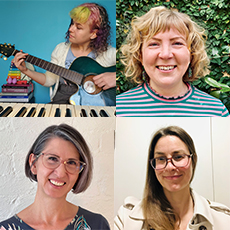Music Therapists’ Lived Experience as a Radical Resource
Moving Beyond Traditional Views on Divergent Bodies and Minds
DOI:
https://doi.org/10.15845/voices.v25i2.4216Keywords:
disability, lived experience, ableism, music therapy, advocacyAbstract
Within this two-part multimedia publication, music therapists from Australia and Aotearoa, New Zealand present and consider a composite character’s experiences of ableism in music therapy study and practice, drawing from current literature and their lived experiences of disability, neurodivergence, and chronic health conditions. Mainstream healthcare approaches have traditionally prioritised amending perceived deficits. Many contemporary approaches shift focus to supporting individuals to access their full potential by utilising personal strengths and resources. Despite this shift, the options considered viable within this “full potential” still seem influenced by ableist assumptions embedded in healthcare literature, professional registration requirements, and wider societal systems and structures. Cumulatively, these assumptions position disabled identities and experiences as inherently incompatible with those of healthcare professionals. Beyond perpetuating disempowering narratives, this compromises the inclusivity and future potential of music therapy as a discipline and profession. Disabled clinicians are uniquely positioned to identify the aspects of clinical practice and study that disproportionately disadvantage disabled people, as well as options for circumventing or dismantling these barriers. Expertise developed through both receiving and facilitating professional healthcare services as a disabled person can also enhance participant experiences by informing the development and provision of more inclusive and relevant therapeutic frameworks.

Downloads
Published
How to Cite
Issue
Section
License
Copyright (c) 2025 Brede Davis, Zoë Kalenderidis, Grace Thompson, Carolyn Shaw

This work is licensed under a Creative Commons Attribution 4.0 International License.
Articles published prior to 2019 are subject to the following license, see: https://voices.no/index.php/voices/copyright

